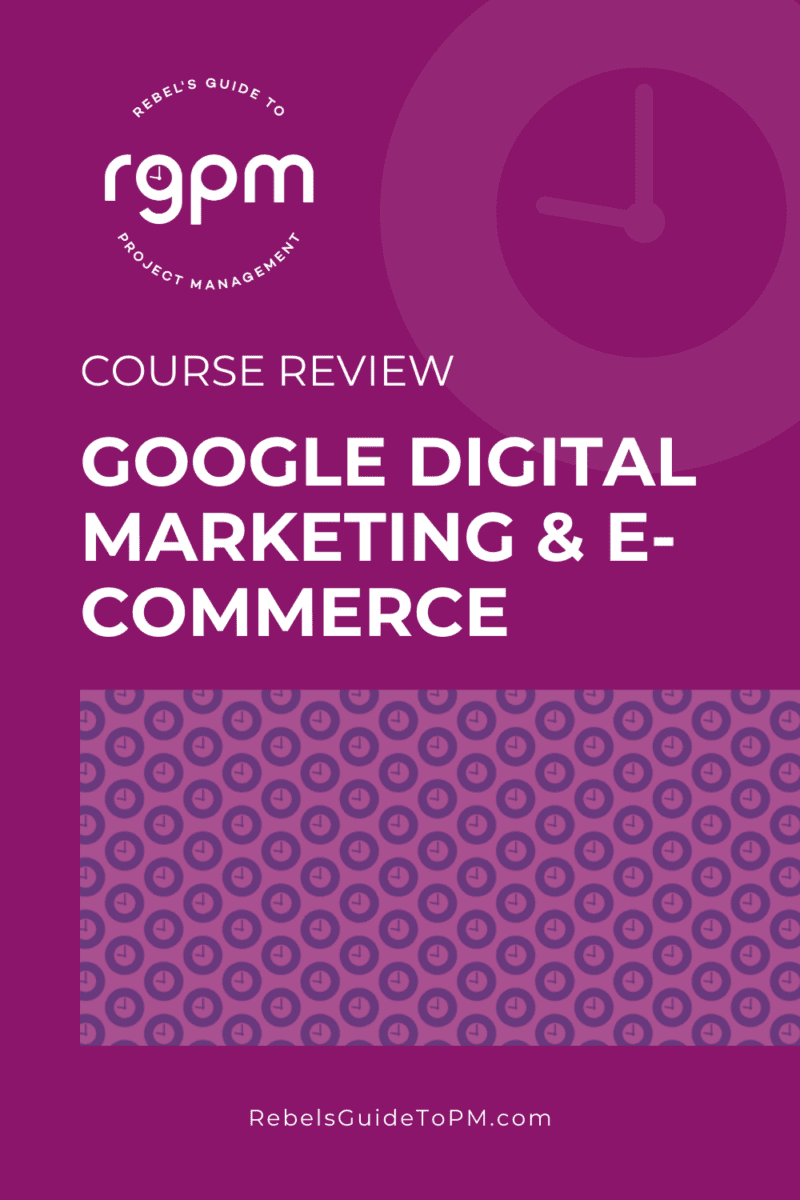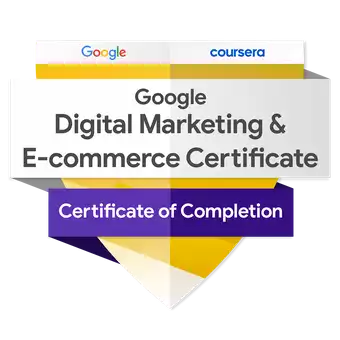I took the Google Digital Marketing & E-commerce course (Review)
This blog is reader-supported. When you purchase something through an affiliate link on this site, I may earn some coffee money. Thanks! Learn more.
If you’ve arrived here, you’re probably ready to get into my Google Digital Marketing & E-commerce: Professional Certificate review! Digital marketing is a core skill for many people in lots of roles today, not just marketing jobs.
I took the course, passed the tests and earned the certificate, just so you know that I know what I’m talking about!
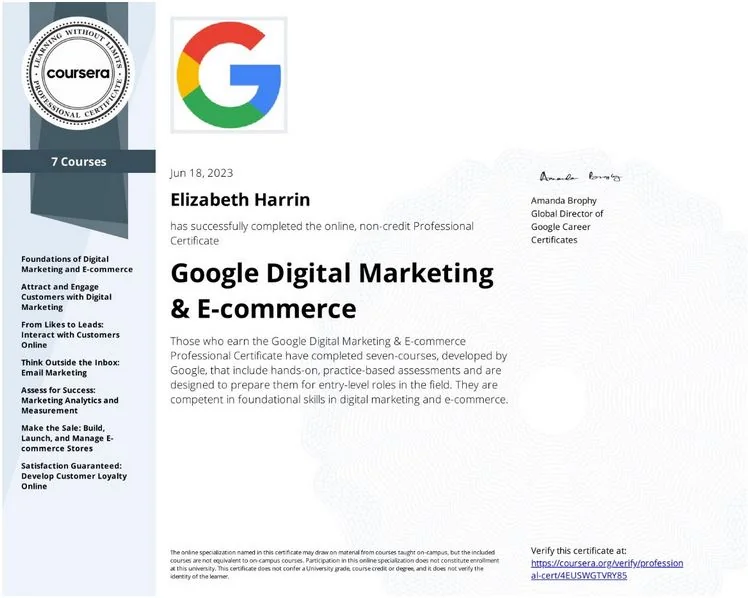
E-commerce skills are useful if you’re working on a project which includes websites or a front-end payment system for users. You don’t have to be programming the website: understanding e-commerce gives you the
Digital marketing skills are essential for understanding branding and how your organization operates online, even if you aren’t the one creating assets for sharing on social media.
And of course, if you want a job in Marketing, it’s essential that you understand digital engagement with consumers.
Google Digital Marketing Certificate on Coursera: What you need to know
In this
- Why the
Google Digital Marketing & E-commerce certificate doesn’t require pre-requisites (and what you do need to pass) - Why it’s especially good for entry level professionals and those wanting basic knowledge to supplement their other roles.
- How long you’ll need to spend going through the course materials before you pass, and what that process looks like.
This course is one of the most popular digital certifications out there, with thousands of students from around the world. I’ve spent many hours reviewing the materials and going through the lessons for this

How I did this review
I completed the
Who is the Google Digital Marketing & E-commerce Certificate for?
The Google Digital Marketing Certificate is aimed at complete beginners. There are 7 courses and they quickly start to build skills so even if you are a marketing coordinator already, the courses serve as a good refresher.
You don’t need any prior knowledge or pre-requisite study, or any particular education requirements in order to take the certificate. Everything is explained very clearly, so even if you don’t know anything about marketing, you’ll quickly get up to speed.
If you do know something about a topic, you can skip through the videos on fast speed or move directly to the quizzes until you get to a topic you need to learn about.
The Coursera digital marketing certification is great for:
- People who want to secure their first role as a marketing coordinator, e-commerce associate, content marketer, search analyst or similar entry level digital roles.
- Marketing project managers who want the language to be able to talk to colleagues.
- People who want to add digital marketing to their broader business skillset.
I’d also recommend it for bloggers and small business owners who need to manage an online presence, for example on their social media platforms.
A great course aimed at people wanting entry-level marketing jobs, with a focus on digital, online, email and e-commerce. Practical, cost-effective and professional training from Google.
I spent time doing the course, and I think it’s great for early-career marketeers because:
- It covers pretty much everything you need to know about digital marketing channels to be ready for an entry-level job.
- It’s from
Google . The certificate has great brand recognition from a relevant brand. - It’s cost-effective and comprehensive.
- It’s fully online which means it’s easy to fit study around your other commitments.
Alternative training to consider
If you want to work with social media influencers on Facebook or Instagram, or want to focus on learning about paid ads on those platforms, then the
Look at the Meta Social Media Marketing Professional Certificate instead. I mean, you could do them both for a rounded marketing training. You can read my comparison of the two to help make a choice.
Will it help you get a job?
The question I’m asked the most is: “Was the course worth it?”
If you are considering going for a marketing job, and want a lower cost, low-barrier-to-entry course to get started with, this is great. It will show you what the job entails so you can check it’s really what you want to do before you commit further.
Once you’ve completed the course, you can look for jobs like these:
- Digital Marketing Assistant (£25–35k UK)
- SEO Executive (£30–40k)
- Email Marketing Associate (£28–38k)
I’ve written another article specifically about the kinds of job opportunities with the Google Marketing Certificate you can expect to go for once you’ve passed the certificate, and that will help you see the options.
There is no capstone project, so if you want to build a portfolio, create your own campaign using what you’ve learned on the course to showcase at interview.
Update your LinkedIn profile to share your badge and achievement, as employers can use that to verify that you really have passed the course.
Or, if you’re already in the job, it will quickly give you confidence in the digital marketing strategies and key technical skills you need to succeed.
Read next: Are Google Certificates helpful in getting a job? Employers share their thoughts.
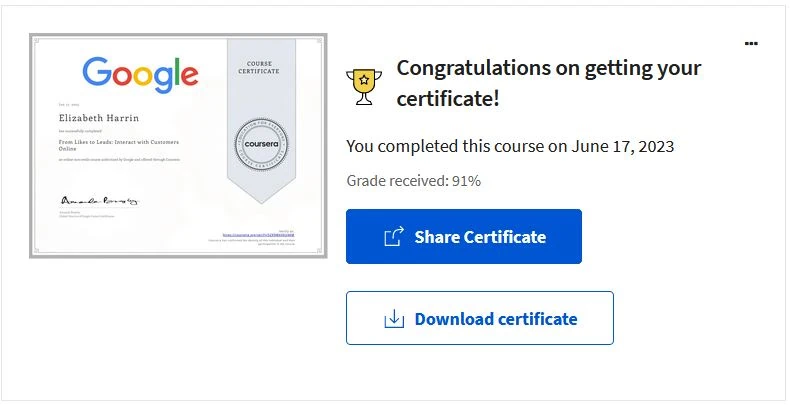
About the course and structure: what’s inside the training
The certificate is made up of 7 courses. These are:
- Foundations of digital marketing and e-commerce
- Attract and engage customers with digital marketing
- From likes to leads: interact with customers online
- Think outside the inbox: email marketing
- Assess for success: Marketing analytics and measurement (don’t miss this one!)
- Make the sale: Build, launch and manage e-commerce stores
- Satisfaction guaranteed: develop customer loyalty online
You don’t have to take them in order, but it makes sense to do so as they build as you go through.
You do have to take them all (and pass them all) to be awarded the certificate.
Topics covered
Each course is made up of several modules that take you into the various topics. I was impressed at how wide-ranging the courses were and the variety of topics covered.
You’ll learn about
The course covers setting up an e-commerce storefront and product listings, online channels for marketing, campaigns and customer journeys. There’s also a complete course on email marketing.
You’ll gain in-demand skills as well as context for putting your campaigns into action by understanding the marketing funnel and how to reach potential customers. Customer insights and personas are covered, and there are exercises to help you put your knowledge into practice.
How the certificate is delivered on Coursera
The course is designed to help you succeed. If you work through the courses, take the quizzes and do the assignments, you will pass.
However, it’s not a quick-win course, you will have to put some effort in.
I’ll be honest, I didn’t do all the assignments. You don’t have to in order to pass, but if you want to build a portfolio of evidence you can talk about at interview, then it’s important you do the activities that will give you the skills.
Like the other Google Career Certificates, the course materials include:
- Training videos that cover core topics
- ‘Day in the life’ videos of people talking about their job roles
- Transcripts – these sit under the videos and the relevant text is highlighted as the speaker talks
- Reading materials and helpful resources
- Activities with templates
- Discussion forums including a peer review request forum where you can ask other students to comment on your work.
The videos are informative and well put together.
I liked that the examples used are real-world scenarios and reflective of the kind of projects that you would be managing in an actual entry-level marketing role.
The course content is very good, and the Coursera platform is excellent for learning. I like the reminders and note features as well as the ability to speed up video playback. It’s very much designed with the learner in mind.
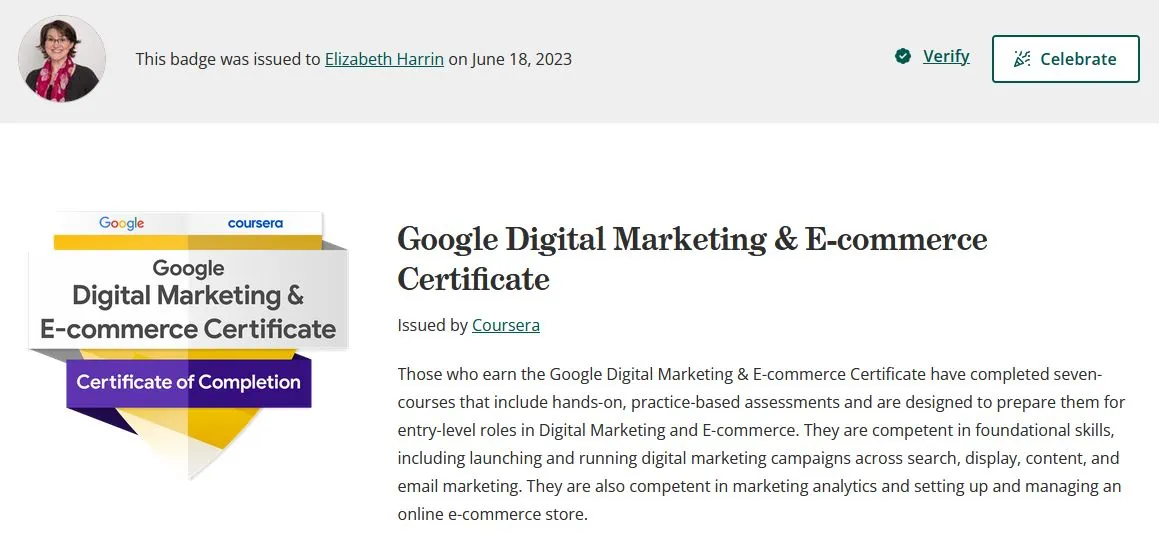
How long does the Google Digital Marketing & E-commerce specialization take?
The
The first course (Foundations) is slated to take 24 hours but I did it much faster than that. It really depends on your level of prior knowledge, how fast you read, whether you watch the videos on 1.5x speed, whether you skip the videos of professionals talking about their jobs, which are interesting but not essential to completing the assignments. There are quite a lot of those, so you could easily skip a couple if you were short of time.
So, how long does the
How do you pass the Google Marketing certificate on Coursera?
Each module includes practice quizzes that help you prepare for the end of module graded quiz. There are other exercises to do as well, such as reflection exercises with discussion prompts. The discussion prompts are ‘published’ in the forums and you can read what other people have written.
These are optional, but it’s useful for you to reflect on why you want to take this course, or your past experience, as these are the kinds of things that are going to come up at interview.
The assumption is that you will take about 1 month per course, which is 1 week per module. Overall, that’s 6 months to work through the materials.
I think you can do it much faster if you dedicate time to it (I did), but it is going to depend on how interested you are in the topic and how seriously you take it. Skip too much, and you won’t actually learn anything – and it will take you an age to get through the graded quizzes as you won’t have the knowledge.
The exact amount of time you’ll have to spend is going to depend on how much time you can dedicate to studying, and how quickly you pick up the concepts.
Taking the graded quizzes
Each module ends with a graded quiz. Coursera is clear that it has to be your own work, so there are pop ups that require you to commit to the honor code and promise that it’s all your own work.
Don’t panic though – you can have reference materials (i.e. the course content) open in another browser window. There is plenty of time to look up the answers if you need to go back to the reading or video where the topic was discussed. Consider the quizzes like an open book test.
There are no peer-graded assignments for this certificate, unlike the Google Project Management Certificate. There is no Capstone course either.
What you need to pass the course
To pass the course, you need time, dedication, and an internet connection!
I’d recommend that you get a notebook (or digital note app) to capture key points so you can come back to your notes as you do your job. You definitely don’t need previous experience.
You’ll also need to pay for it. The cost of the digital marketing certificate is £46 per month or the equivalent in your country, for as long as it takes you to pass. At the recommended pace, that would be £276. The faster you do it, the cheaper it is. There is also a 7-day free trial which gets you access to a lot of the courses, not just this one.
Financial aid is available if you want to apply for it.
Pros
The advantages of the
- It’s value for money. Especially if you use a Coursera Plus subscription or do as much as possible within the 7-day free trial.
- It’s comprehensive at a beginner’s level, covering lots of aspects of digital marketing.
- There are enough activities in the course to give you a portfolio of examples to share at interview.
- You get a Credly badge to evidence your achievement.
- The interviews with professionals give you a real feel for the job.
- It’s excellently put together with high quality content and production values.
- There is no final exam!
If you are the kind of person that likes community, you’ll enjoy hanging out in the discussion forums. I didn’t use them, but it’s a good feature to check in every so often.
Cons
It was hard to think of things to put in this section as I didn’t have any complaints. However, for balance, here are the disadvantages of the certificate based on my experience going through it.
- There is not much marketing theory on the basics: it’s all straight into digital stuff from the Foundations course.
- There are no peer reviewed assignments, so you could (in theory) take the quizzes and pass without having any real evidence of doing any learning.
- The course is geared towards people looking for an entry-level digital marketing job so there is a lot of material around access to career resources. If you are doing this certificate to supplement your existing knowledge, you might not need all the content around how to get a job in the digital marketing field.
Finally, popular platforms are covered like
If you’re an experienced marketer, you might find it too easy, but it’s always good to learn from others and continue your professional development, right?
A great course aimed at people wanting entry-level marketing jobs, with a focus on digital, online, email and e-commerce. Practical, cost-effective and professional training from Google.
Recommendation: Should you buy this course?
If you are seriously considering a career in marketing or online business and want to show employers that you have got the basics down, then this is a great course.
The certificate is from a brand that they will recognize, and the popularity of the Google certificates is only going to grow in my opinion, as the ones I have taken have all been top quality, cost-effective and interesting.
So my recommendation is that it is worth it. Marketers I’ve heard from say the same thing.
Get a Coursera subscription, or book a week off work and use the free trial time to work through as much as you can!
Of course, you can pace yourself at a course a month, working through a module a week (or so, most courses have more than 4 modules) and fit your learning into lunch breaks and commuting time.
I should let you know that I am impressed with the course and that I’m now an affiliate for the Coursera platform so I can recommend it, but I only recommend products I have tested out and am confident in.
FAQ
Is the Google Digital Marketing & E-commerce Certificate worth it?
Yes! Having taken the certificate myself, I believe it’s worth it for entry-level and beginner marketeers and online business owners, or those who want to make a career in SEO, PPC, email marketing or related areas.
Is the Google Digital Marketing & E-commerce Certificate free?
No. The certificate isn’t free, but you can audit the course for free. Coursera offers you the option of working through the materials (except the graded quizzes) at your own pace for free. When you are ready, you can upgrade to unlock the graded assignments and become eligible to earn the certificate.
If you want to learn but aren’t bothered about getting the certificate, you can access most of the content for free.
Does the Google certificate count towards professional development?
Yes, if your professional body requires you to do continuous professional development, and you can argue that this course is relevant (which it would be, if you work in a marketing job) then you can count these training hours towards your ongoing requirement for CPD.
